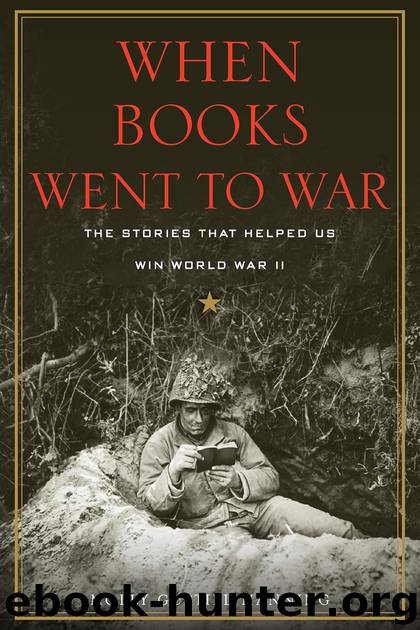When Books Went to War by Molly Guptill Manning

Author:Molly Guptill Manning
Language: eng
Format: epub
Publisher: Houghton Mifflin Harcourt
The council decided it was duty bound to wage a fight for the repeal of Title V. From a monetary perspective, it did not matter to the council if one book was disqualified for ASE publication, since another would take its place. Yet the council could not tolerate the censorship of the servicemen’s reading materials, or the precedent set by the legislation. As Archibald Ogden, executive director of the council, grumbled: “It looks as though from now until November, we can publish nothing but ‘Elsie Dinsmore’ and ‘The Bobbsey Twins.’”
In late May 1944, the council began a campaign to pressure Congress to repeal the law. A letter was sent to editors of every major newspaper and magazine in the United States, which explained the council’s ASE program and the effects of the Soldier Voting Act. The council asked that newspapers and magazines, which surely valued the freedom of the press, publish articles that would alert the public to the government’s infringement of the servicemen’s basic freedoms.
The degree of cooperation from the media was extraordinary. Throughout June and July 1944, critical articles were published lamenting the plight of the council as it strove to print a variety of books while the government worked to censor its selections. “Censorship for political reasons is a Fascist device which has no place in the United States,” avowed the Syracuse Post-Standard. It is “ridiculous to set the armed forces as a class apart from civilians in control of reading material.” An article published in Columbia, South Carolina, explained that, “since every voter except those who blindly follow a party line makes his decision on the basis of political, economic, and social thinking, this can only be interpreted by the Army and Navy authorities to mean a ban from service men’s libraries, reading rooms, and moving picture shows, of everything that inspires, however indirectly, social, economic, and political thought.” It was difficult to believe that American libraries and reading rooms were being subjected to a “Goebbels’s purge” because of a federal law, the article concluded. Virginia’s Lynchburg Daily Advance lamented that, under the act, “almost any book except cook books, fairy tales, or text books on such subjects as astronomy and mathematics would be banned.” “If it is to be left to the Adjutant General to decide what the Army is to be permitted to read then we might as well join the Nazis and stop fighting them.” An article in the San Antonio News said: “One would think that the men who fight the Nation’s battles would be quite able to decide for themselves what they would like to read,” and that “maybe they would rather skip voting this year than to have their reading-material censored.”
The Chicago Sun suggested the public not kid itself about the true nature of the act and Title V: it was a Republican move to deprive Roosevelt of a fourth term. “Congress in its wisdom has decreed that fighting men should be insulated from political ‘propaganda.’ The idea was to protect these innocent young men from nefarious attempts to sway them for a F - - - th T - - m.
Download
This site does not store any files on its server. We only index and link to content provided by other sites. Please contact the content providers to delete copyright contents if any and email us, we'll remove relevant links or contents immediately.
| Booksellers & Bookselling | General |
| History of Books |
4 3 2 1: A Novel by Paul Auster(11108)
The handmaid's tale by Margaret Atwood(6907)
Giovanni's Room by James Baldwin(5950)
Big Magic: Creative Living Beyond Fear by Elizabeth Gilbert(4772)
Asking the Right Questions: A Guide to Critical Thinking by M. Neil Browne & Stuart M. Keeley(4635)
On Writing A Memoir of the Craft by Stephen King(4259)
Ego Is the Enemy by Ryan Holiday(4034)
Ken Follett - World without end by Ken Follett(3999)
The Body: A Guide for Occupants by Bill Bryson(3874)
Bluets by Maggie Nelson(3753)
Adulting by Kelly Williams Brown(3711)
Guilty Pleasures by Laurell K Hamilton(3626)
Eat That Frog! by Brian Tracy(3559)
White Noise - A Novel by Don DeLillo(3460)
The Poetry of Pablo Neruda by Pablo Neruda(3401)
Alive: The Story of the Andes Survivors by Piers Paul Read(3342)
The Book of Joy by Dalai Lama(3268)
The Bookshop by Penelope Fitzgerald(3256)
Fingerprints of the Gods by Graham Hancock(3248)
